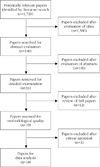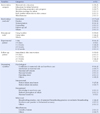Abstract
Purpose
The purpose of this study was to determine the current state of nursing intervention for maternal adaptation and its' effectiveness in Korea by utilizing a systematic review.
Methods
The PICO(Population-Intervention-Compar ator-Outcome) strategy was established, and 1,720 pieces of literature published during the last ten-year period from four electronic databases were reviewed. Eighteen references that met inclusion and exclusion criteria were finally selected for systematic review. The quality of references using critical appraisal checklist for experimental studies were evaluated, and then systematic review and meta-analysis were conducted.
Results
All 18 references were quasi-experimental research design. Most interventions were provided at the hospital and postpartum care center. Maternal adaptation interventions appeared to be of many types, and particularly maternal role education programs were the most common. Confidence in maternal role was used as the most common variable for the maternal adaptati on. Various interventions for helping maternal adaptation in the postnatal period improved maternal confidence, moth er-infant attachment, maternal satisfaction and mother-infant interaction effectively.
Figures and Tables
References
1. Armstrong KL, Fraser JA, Dadds MR, Morris J. Promoting secure attachment, maternal mood and child health in a vulnerable population: A randomized controlled trial. J Paediatr Child Health. 2000; 36:555–562.

2. Association for Research on Women's Health Subject. Women's Health Nursing. Seoul: Soomoonsa;2012.
3. Bang KS, Park JS, Kim JY, Park JY, An HS, Yun BH. Literature review on nursing intervention for premature infants in Korea. J Korean Soc Matern Child Health. 2013; 17:49–61.
4. Bench S, Day T, Metcalfe A. Randomised controlled trials: An introduction for nurse researchers. Nurse Res. 2013; 20(5):38–44.

5. Biau DJ, Kernéis S, Porcher R. Statistics in brief: The importance of sample size in the planning and interpretation of medical research. Clin Orthop Relat Res. 2008; 466:2282–2288. http://dx.doi.org/10.1007/s11999-008-0346-9.

6. Brown S, Small R, Argus B, Davis PG, Krastev A. Early postnatal discharge from hospital for healthy mothers and term infants. Cochrane Database Syst Rev. 2009; 3:1–44.

7. Chae MY, Hwang MS. The effects of home care nursing based maternal role strengthening programs on the maternal identity and confidence of maternal role on first-time mothers. J Korean Acad Soc Home Care Nurs. 2011; 18:88–98.
8. Chea HJ, Kim S. Effects of maternal role practice education on becoming a mother. Korean J Women Health Nurs. 2011; 17:52–63. http://dx.doi.org/10.4069/kjwhn.2011.17.1.52.

9. Ellberg L, Högberg U, Lundman B, Källén K, Håkansson S, Lindh V. Maternity care options influence readmission of newborns. Acta Paediatr. 2008; 97:579–583. http://dx.doi.org/10.1111/j.1651-2227.2008.00714.x.

10. El-Mohandes AA, Katz KS, El-Khorazaty MN, McNeely-Johnson D, Sharps PW, Jarrett MH, et al. The effect of a parenting education program on the use of preventive pediatric health care services among low-income, minority mothers: A randomized, controlled study. Pediatrics. 2003; 111:1324–1332.

11. Fontenot HB. Transition and adaptation to adoptive motherhood. J Obstet Gynecol Neonatal Nurs. 2007; 36:175–182.

12. Jeong IS, Jun SS, Hwang SK. Systematic reviews and meta-analysis. Seoul: Soomoonsa;2011.
13. Kim H, Jeong I. Effects of a newborn care education program on newborn care confidence and behavioral accuracy of primiparas in a postpartum care center. J Korean Acad Nurs. 2007; 37:125–134.

14. Koh HJ, Lim KH. A comparison of the educational needs of the mother's for the infant care between primipara and multipara. Korean J Child Health Nurs. 2002; 8:217–228.
15. Lee EO, Lim NY, Park HA, Lee I, Kim JI, Bae J, et al. Nursing research and statistical analysis. Seoul: Soomoonsa;2009.
16. Mercer RT. Becoming a mother versus maternal role attainment. J Nurs Scholarsh. 2004; 36:226–232.

17. Mercer RT. Nursing support of the process of becoming a mother. J Obstet Gynecol Neonatal Nurs. 2006; 35:649–651.

18. Mercer RT, Walker LO. A review of nursing interventions to foster becoming a mother. J Obstet Gynecol Neonatal Nurs. 2006; 35:568–582.

19. Ministry of Health and Welfare. Survey on postpartum care center. Seoul: Author;2010.
21. Nicolson P. Loss, happiness and postpartum depression: The ultimate paradox. Can Psychol. 1999; 40:162–178.

22. Nyström K, Ohrling K. Parenthood experiences during the child's first year: Literature review. J Adv Nurs. 2004; 46:319–330.

23. Park HS. The effects of a nursing intervention program utilizing NCASA(Nursing Child Assessment Sleep/Activity) on primipara. Busan: Kosin University;2005. Unpublished doctoral dissertation.
24. Pearson A, Field J, Jordan Z. Evidence-based clinical practice in nursing and health care: Assimilating research, experience and expertise. Oxford: Blackwell;2007.
25. Pridham K, Brown R, Clark R, Limbo RK, Schroeder M, Henriques J, et al. Effect of guided participation on feeding competencies of mothers and their premature infants. Res Nurs Health. 2005; 28:252–267.

26. Sim KS, Kho HJ, Lim KH. A study on the educational needs of the mothers for the infant care. J Korean Soc Matern Child Health. 2002; 6:287–297.
27. Song JE, Park BL. [The changing pattern of physical and psychological health, and maternal adjustment between primiparas who used and those who did not use sanhujori facilities]. J Korean Acad Nurs. 2010; 40:503–514. http://dx.doi.org/10.4040/jkan.2010.40.4.503.

28. Taylor JA, Kemper KJ. Group well-child care for high-risk families: Maternal outcomes. Arch Pediatr Adolesc Med. 1998; 152:579–584.
29. Vermaes IP, Janssens JM, Bosman AM, Gerris JR. Parents' psychological adjustment in families of children with spina bifida: A meta-analysis. BMC Pediatr. 2005; 5:32. http://dx.doi.org/10.1186/1471-2431-5-32.





 PDF
PDF ePub
ePub Citation
Citation Print
Print







 XML Download
XML Download